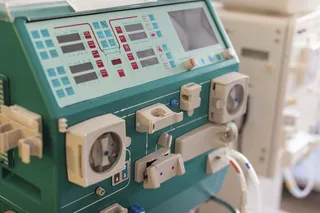What You Need to Know About Kidney Health
March is National Kidney Month.

1 / 16
March Is National Kidney Month - Did you know that this month is National Kidney Month? Read more about what these organs do for your body, how to protect them and how kidney disease impacts African-Americans. —Kellee Terrell Photo: De Agostini Picture Library/De Agostini/Getty Images)

2 / 16
Where Are My Kidneys? - Your two kidneys, which are both the size of a fist, are located toward the bottom of your rib cage by your spine. One on the right, the other on the left. (Photo: Getty Images/STOCK)
Photo By i love images/Getty Images

3 / 16
What Exactly Do Kidneys Do? - Your kidneys act like a Brita filter. They remove the excess waste and drugs that build up through the body. Your kidneys help remove this waste through your urine. Kidneys also help regulate your blood pressure, release hormones and control the replication of red blood cells. (Photo: MCT /Landov)

4 / 16
What Is Kidney Disease? - Chronic kidney disease (CKD) can stop your kidneys from filtering out the waste. CKD can also make you develop other issues such as anemia, diabetes and high blood pressure and can lead to kidney failure. Some kidney damage is permanent and can lead to death. (Photo: REUTERS/Jason Reed /Landov)

5 / 16
African-Americans and Kidney Disease - Blacks are more at risk than any other race and ethnicity. One in three people suffering from kidney failure are African-American, says the American Kidney Fund. That’s a whopping 150,000 African-Americans. (Photo: Getty Images/STOCK)
ADVERTISEMENT

6 / 16
What is Kidney Failure? - Kidney failure is a diagnosed ailment when your kidneys have serious issues and/or stop functioning without the help of treatment. This happens when the body has a build up of waste. Some kidney failure can be treated, but some may be irreversible. (Photo: CNRI AND SCIENCE PHOTO LIBRARY/Science Photo Library/Corbis)

7 / 16
Signs of Kidney Failure - Initially kidney failure may cause no symptoms, but it may also present itself as weakness, shortness of breath and confusion. Kidney failure is serious and can cause death if not treated. (Photo: JGI/Jamie Grill/Blend Images/Corbis)

8 / 16
Treatment Options - There are different forms of dialysis, a process that helps perform the job that your kidneys can no longer do because they are so damaged. Most people receive dialysis a few times a week. Another treatment is a kidney transplant, which is found to be very successful. Yet, a 2012 study found that African-Americans are less likely to receive kidney donors. (Photo: BRENDAN SMIALOWSKI/AFP/GettyImages)

9 / 16
How Many Blacks Are on Dialysis - African-Americans constitute more than 32 percent of all patients in the U.S. receiving dialysis for kidney failure.(Photo: Dario Lo Presti/Getty Images)
Photo By Photo: Dario Lo Presti/Getty Images

10 / 16
Why Diabetes Matters - It’s believed that diabetes play a role in this racial health disparity. Diabetes is the number one cause of kidney failure and we are twice as likely to be diabetic. And diabetes impacts Blacks differently than whites—with one in 9 Black adults have diabetes. And that number is on the rise. (Photo: David McNew/Getty Images)
ADVERTISEMENT

11 / 16
Why High Blood Pressure Matters - Another risk factor that puts Black more at risk for kidney failure is high blood pressure, especially when it goes unchecked and unmanaged. African-Americans are six times as likely to get kidney failure from their high blood pressure than whites. It’s estimated that 42 percent of all Black adults have high blood pressure. (Photo: 13/Thomas Northcut/Ocean/Corbis)

12 / 16
What's Behind the Health Disparity? - A 2014 study found that genetics might also be behind this racial health disparity. Genetic markers such as the APOL1 gene occur with much greater frequency in the African-American population. These markers may explain why kidney disease seems to progress more rapidly in the black population than any other racial group, writes the Huffington Post. (Photo: Stocktrek Images/Corbis)

13 / 16
Know Your Family History - Knowing your family history can save your life when it comes to kidney disease. Talk to everyone from your parents, grandparents and beyond and ask whether anyone in your family has high blood pressure, diabetes or kidney disease. Investigate who in your family has had a kidney transplant or been on dialysis. (Photo: JGI/Blend Images/Corbis)

14 / 16
Why Health Care Matters - Lack of access to health care is another reason why we disproportionately suffer from kidney disease and failure. Unfortunately, one in five African-Americans is uninsured. Getting screened and keeping your diabetes and high blood pressure in check are crucial in controlling kidney disease. (Photo: Getty Images/STOCK)

15 / 16
Preventing Kidney Disease - Kidney disease doesn’t have to be our destiny. Eating healthy foods, maintaining a healthy weight and being active can make a huge difference. So can getting screened for kidney disease, high blood pressure and diabetes and staying on top of your meds if you are diagnosed with any of these illnesses. (Photo: Getty Images/STOCK)
